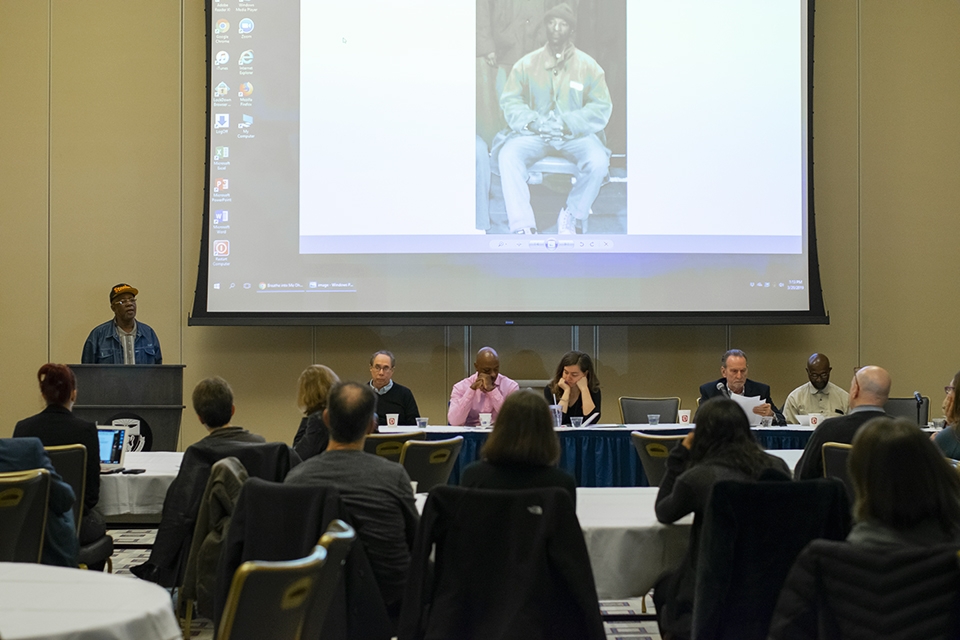
3/21/2019
Griffin Sendeck | Features Editor
As part of the fifth annual Day of Learning and Speaking Out Against Racial Injustice, “Whiteness: From Complicity to Solidarity,” five different discussions were held in the Fides Shepperson Suite of the Power Center on Wednesday.
The five events included: Hate in America: Hate and Extremism in Pennsylvania and Abroad; Working across Boundaries to Achieve Solidarity: A Panel of Partners; Race and Pedagogy: A discussion of Readings; Not Giving Up: Maintaining Our Commitment to Justice in Unjust Time and A Walk in My Shoes – Sacred Conversations on Race Student Roundtable Discussion.
The talks ran intermittently from 10:00 a.m. until 9:00 p.m.
During the Working Across Boundaries discussion, members of the Elsinore Bennu Think Tank for Restorative Justice, including a panel of formerly incarcerated citizens, a lawyer and a Duquesne professor, spoke at length about restorative justice.
This event, which ran from 1:00 p.m. to 3:00 p.m., began as a tribute for one of the founding members of the Think Tank, Richard “Khalifa” Diggs. It opened with what was said to be his favorite song, “Breathe into Me Oh Lord” by Fred Hammond.
Diggs had been charged with a double homicide and sentenced to life in prison. In his time in prison, he started writing stories about his life. Members of the panel, Alexander “Big Lew” Lewis and Foster Tarver stood at the podium and read aloud a piece that Diggs had written, titled See Me.
Diggs died of pancreatic cancer in December 2017 in prison.
Diggs was one of the members of a class taught at the State Correctional Institution (SCI) – Pittsburgh by “Little Lew” Louis Gentile, and over the years they formed a strong friendship.
Gentile was the former director of the bureau of narcotics when he met Diggs. Even though Gentile didn’t receive any payment for the course, he continued to teach for seven years, until the program was eliminated as part of a new action from the state to “get tough on crime,” according to Gentile.
Gentile was very critical of the program’s closure, stating that recidivism of the inmates involved dropped by 70 percent.
After Gentile’s program closed at SCI Pittsburgh, he received an invitation to become involved with the Elsinore Bennu Think Tank.
The Think Tank deals primarily with the ideas of restorative justice with the fundamental idea that it is never too late for anyone to re-enter society post-incarceration. It meets Friday mornings in Canevin Hall, where the attendees “try to make a gracious space” and spend time learning “from each other and with each other,” according to Dr. Rick McCown.
McCown uses the phrase “bright spots” when describing panel members Taili Thompson, Alexander Lewis and Foster Tarver. After inmates are released from prison, they are statistically more likely to end up back behind bars in few years. McCown has referred to these individuals as experts regarding rehabilitation.
Thompson, Lewis and Tarver each shared their own personal stories of reentry into society.
The panel allotted time to answer questions from the audience. One student asked Tarver how, after spending 49 years in prison, he never gave up hope.
“Even if you can’t change your environment, you can change yourself,” Foster said, reiterating multiple times the importance of keeping faith.
Later in the panel discussion, a video-interview of Diggs was projected on the screen.
At the time of the interview, Diggs had been in prison for 19 years. In the video Diggs introduced himself and told how Khalifa was a name he adopted in 1977 in Allegheny County Jail. He said that it was derived from an Arabic word meaning “protector,” “community leader” and “provider.”
Diggs viewed children as the future. The last thing he ever wanted was to see children grow up headed down the path towards incarceration.
“They represent our future and without them, I don’t see nothing but destruction,” Diggs said. “If we think we can go on without our youth, there’s something wrong with us as adults.”
Diggs went as far to say that he would give his life to see the youth provided for. He wasn’t afraid of death, but rather, he was scared of not being able to get out of prison and provide for his family and community in the way he wanted.
“I fear not being able to be a human being,” Diggs said.

